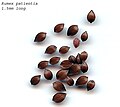Rumex patientia
Appearance
| Rumex patientia | |
|---|---|

| |
| Patience dock | |
| Scientific classification | |
| Kingdom: | Plantae |
| Clade: | Tracheophytes |
| Clade: | Angiosperms |
| Clade: | Eudicots |
| Order: | Caryophyllales |
| Family: | Polygonaceae |
| Genus: | Rumex |
| Species: | R. patientia
|
| Binomial name | |
| Rumex patientia | |
Rumex patientia, known as patience dock,[4] garden patience, herb patience, or monk's rhubarb, is a herbaceous perennial flowering plant belonging to the family Polygonaceae. In spring it is often consumed as a leaf vegetable and as a filling in pies in Southern Europe, especially in Bulgaria, North Macedonia and Serbia. It is also used in Romania in spring broths or sarmale.
Uses
The leaves can be eaten raw or cooked, but do contain oxalic acid, so should not be eaten in excess (e.g. every day). The leaves can be used raw in salads, cooked in soups and stews, or layered in baked dishes like lasagna. The leaves are high in minerals, and can be harvested at any time.[5]
Gallery
-
Seeds
-
Rumex patientia - MHNT
References
- ^ UniProt. "Species Rumex patientia". Retrieved 2008-07-02.
- ^ "Rumex patientia". Integrated Taxonomic Information System. Retrieved 2 July 2008.
- ^ "Rumex patientia". International Plant Names Index (IPNI). Royal Botanic Gardens, Kew; Harvard University Herbaria & Libraries; Australian National Botanic Gardens. 2008-07-02.
- ^ BSBI List 2007 (xls). Botanical Society of Britain and Ireland. Archived from the original (xls) on 2015-06-26. Retrieved 2014-10-17.
- ^ Martin Crawford (2012). How to grow Perennial Vegetables. ISBN 978-1-900322-84-3.
6. Sukhorukov Alexander P. 2011. New invasive alien plant species in the forest-steppe and northern steppe subzones of European Russia: Secondary range patterns, ecology and causes of fragmentary distribution. - Feddes Repertorium. Vol. 122, No. 3 -4. Pp. 287-304. [1]
External links
![]() Media related to Rumex patientia at Wikimedia Commons
Media related to Rumex patientia at Wikimedia Commons
- Linnæi, Caroli (1753). "Trigynia". Species Plantarum, Exhibentes Plantas Rite Cognitas, ad Genera Relatas, cum Differenentiis Specificis, Nominibus Trivialibus, Synonymis Selectis, Locis Natalibus, Secundum System Sexuale Digestas. Retrieved 2008-07-02.
- ^ DOI:10.1002/fedr.201100004


